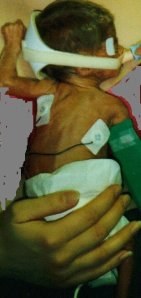After scrubbing and putting on a face mask, I returned to the isolette in the NICU for an update on how my baby was doing, to see what the test results showed. She was so incredibly tiny and fragile. Much of the technology used to treat and monitor her was also very tiny. For example, I had never seen a blood pressure cuff so small in all my days as a registered nursing student. This was a whole new world of medicine to me. And a different life completely now. From one day to the next, everything had changed. Absolutely everything.
I stood gazing at my baby from above the top of the protective face mask, feeling my hot breath against my face, as I pondered the moment and took it all in. She was beautiful. And perfect! In time, I knew that she would grow and become strong. Maybe I was young and naïve, but it gave me a sense of great hope and confidence. I would be resilient, and accepting of whatever I was told. My background had prepared me for responsibility – as an oldest child of twelve (later thirteen) children, years as a babysitter, and education – from gifted student to fifteen-year old full-time college student, intent on becoming a surgeon. My heart was filled with pride and joy. Nothing could take that away from me.
“Are you mom?” the nurse asked me. That startled me a bit. Suddenly, I was a mom. That was my identity here. Outside of the NICU, I wasn’t sure that I had quite reconciled who I was yet in these circumstances. I had always been the smart kid who was going to become very successful and make a difference in the world. I was the golden child – the good one who never did anything wrong. I was sweet and studious and helped my parents. But in the last couple of years, I had begun to question the faith community I had grown up in and what I had been taught. I needed to be able to consent to the life I was living – not just follow with blind obedience. This had led to conflict between my family and me, and people at church began to talk about me behind my back and look at me funny. I was still the same person, a girl with a good heart, but I stirred things up too much and it made people uncomfortable. So they treated me like a problem. And when I couldn’t find the alignment I was looking for, I left it all behind for a new beginning in Uptown Minneapolis. Alone, and never having been away from the tight-knit community that did not allow much outside engagement, I was like a wide-eyed child in the big city. It could have been a foreign country with strange people. None of it made sense to me. And there I was on the fringe of assimilation. “Yes, I am mom,” I managed, as I attempted to own the words.
Observing my two-pound, six-ounce baby through the thick plastic of her environment-controlled isolette, or incubator, I listened to a nurse tell me the prognosis. It was a long list of very serious problems. Because of the trauma of delivery and my baby’s weak blood vessels, she had a brain (intraventricular) hemorrhage – nearly a Grade 4 out of 4. Blood had filled the ventricles of her brain, pushing her brain tissue toward her skull, threatening to crush it under the pressure. My baby’s head was so filled with fluid that it pooled away from her head underneath her skin, pulling the skin with it, so it lay next to her head like a flat bubble. She was on a ventilator because she couldn’t breathe on her own. Her eyes had to be covered with a mask as she lay under three banks of lights for severe jaundice. It would not be known for months if she would be able to see, or if she would be blind. With a condition called retinopathy of prematurity, her eyes would be followed closely by specialists, who sometimes had to do gruesome examinations involving inserting metal tools into her eye sockets while I held her down, swaddled in blankets, screaming. She was on an IV, which went into her head, that delivered fluids and nutrition. In hopes that one day she would be able to take liquids by mouth, I began to pump my breast milk, as soon as the colostrum started to flow. I poured it into small plastic cups, which I labeled and stored in freezers at home and at the hospital. Imagine how a new mom feels when baby sneezes. This was way beyond the sniffles.
The news was hard. As my heart wept, I watched my baby cry. But being on a ventilator, with a tube going in through her mouth into her lungs, no sound could be heard. A silent cry. As a mother you want to hold your baby when he or she cries. But I couldn’t do anything but watch her face express crying, wishing she had a voice, and that I could comfort her in her despair. It would be weeks before I could hold her. And this would be a big production.
For today, she was surviving, and so was I. Whatever I had to do, I would do. I was resolved and centered. So I meditated in the middle of that NICU nursery, summoning all the healing energy of the universe that I could to channel it toward this precious being. And as I spoke to her gently through the box, her vital signs became rhythmic on the machines above. She knew that I was there and that I always would be.
